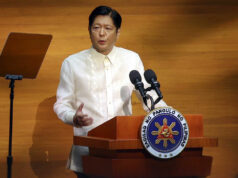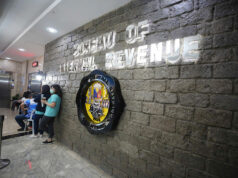Impeachment complaints put members of Congress on trial
“I think it has to happen. There would be a worse effect if it didn’t happen.” That is what President Joe Biden said regarding Donald Trump’s impeachment trial. The trial is set to start on Feb. 9.
Both sides of the political fence presented arguments against going forward with the trial of the former president. Republican senators want to avoid being forced to choose between following their conscience and defending Trump’s behavior out of fear of his punitive reprisal.
Some Democrats think that a trial that would need at least 17 Republicans voting to convict Trump is highly improbable. But leading Democrats argue that what Trump did is too serious to simply move on. A trial by the Senate offers the best way to hold Trump fully accountable for his assault on the Constitution and the rule of law.
Senator Chris Coons of Delaware said, “We need to find a way to hold President Trump and those who encouraged and supported the violent protest that overran our Capitol three weeks ago accountable for our history and our future.”
Also, a number of Democrat senators believe the evidence against Trump is so damning that at least 17 Republican senators will vote to convict Trump. As Senator Richard Blumenthal of Connecticut said, “It’s a question of whether Republicans want to step up and face history.” In other words, Republican senators themselves will be on trial.
The Trump trial brings to mind the impeachment trial of President Joseph Estrada. He was accused of bribery, graft, corruption, violating the country’s 1987 constitution and betraying the public trust.
On Jan. 16, 2001, the impeachment trial moved to the investigation of an envelope believed to contain evidence that proves Estrada received bribe money. His allies in the Senate tried to block the investigation of the envelope. They called for a vote on opening the envelope. The result was 11-10 in favor of not opening the envelope.
Those who voted to suppress the supposed incriminating evidence were Senators Blas Ople, Juan Ponce Enrile, Nikki Coseteng, Gregorio Honasan, Robert Jaworski, Tess Oreta, John Osmena, Ramon Revilla, Miriam Santiago, Vicente Sotto, and Francisco Tatad. The press branded them the Craven Eleven.
That evening, a crowd gathered at the EDSA Shrine to express their indignation at the attempt to protect the impeached president. The crowd grew bigger with every passing day. Realizing that Estrada had lost the support of the people, Cabinet members started to resign. When the military made known it was withdrawing its support, Estrada left Malacanang for good.
Tatad, Honasan, Jaworski, Osmena, and Santiago all lost in their bid for reelection. Coseteng, having reached her term limit as senator, ran for representative of her congressional district, but lost ignominiously. Ople and Revilla decided to retire from politics.
Oreta, who danced the Irish jig and hooted when the prosecutors walked out of the Erap impeachment proceedings, deemed it wise not to run for office again. She instead fielded her daughter as a candidate for representative of the Oreta political bailiwick. Poor girl, she paid for the sin of the mother.
Santiago’s image as a graft buster crashed. She made it to the Senate on her second attempt after the Erap fiasco when she rode on GMA’s lavishly funded and military-escorted campaign caravan.
Mind you, Tatad, Jaworski, Osmena, Coseteng, Oreta, Ople, and Revilla only voted against opening an envelope believed to contain evidence incriminating Erap. They had not voted to dismiss the charges against him. But that one act ended their political career.
That could be the reason why President Gloria Macapagal Arroyo’s allies in the House of Representatives resolutely blocked all attempts to impeach her in 2005 and 2006. They did not want to be forced to decide according to the dictates of their conscience or on the basis of their fear of the retaliation of a known vengeful person.
Allegations of cheating against Arroyo gained momentum one year after the May 2004 election. In June 2005, a former official of the National Bureau of Investigation presented in a press conference audio recordings of wiretapped conversations between Arroyo and an official of the Commission on Elections. The recordings indicated that Arroyo was asking the election official to rig the election so that she would win over her opponent by one million votes.
The recordings became the basis of the impeachment case filed against her that year. But the House of Representatives, dominated by Arroyo lackeys, voted 158-51 to dismiss the complaint.
Another impeachment move was initiated by civil society groups against her in 2006. They accused her of 22 wrongdoings, including rigging the election, corruption, human rights abuses, and violation of the Constitution.
The same rabid supporters of President Arroyo in the Lower House boasted that no impeachment complaint against her would prosper and that the opposition could only blame themselves if the impeachment bid failed because of their failure to get the required number of endorsers of the complaint. I saw their pre-emptive blame-game ploy as their attempt to avoid responsibility for the forthcoming summary dismissal of the impeachment complaint.
But the opposition got the required number of endorsers of the impeachment complaint. In the end, Arroyo’s minions in the House of Representatives had to perform the politically detrimental act they tried to avoid doing.
Sadly, the Catholic bishops of the Philippines allowed themselves to get sucked into the murky political whirlpool. They publicly opposed the impeachment initiative. Said they: “We are not inclined at the present moment to favor the impeachment process as the means for establishing the truth, unless the mindsets of all participating parties are guided by no other motive than genuine concern for the common good.” The bishops feared that if the impeachment process went the same way as the year before, “It would dismay every citizen, deepening the citizen’s negative perception of politicians.”
It did go the same way as the year before. As already said, the minions of Arroyo threw out the complaint. But unlike what the bishops thought, the political exercise didn’t turn out to be unproductive.
The process, though abbreviated it may have been, provided the citizens a good basis for deepening their perception of the members of the House of Representatives. It exposed those who voted on the basis of the common good and those who did on the basis of subservience to their patron, President Arroyo. It enabled the citizens to determine who they should vote out of Congress in the next election.
And the formerly revered Catholic bishops lost their moral ascendancy to pontificate about good governance and to denounce corrupt officials. By condoning Arroyo’s attempt to rig the election of 2004 – one archbishop said “everybody cheats anyway” – the citizens turned their back on the bishops. It is for this reason that the Catholic Bishops Conference of the Philippines has been laconic about the present dubious administration.
It’s good to make impeachment complaints happen.
Oscar P. Lagman, Jr. is a retired corporate executive, business consultant, and management professor. He has been a politicized citizen since his college days in the late 1950s.



